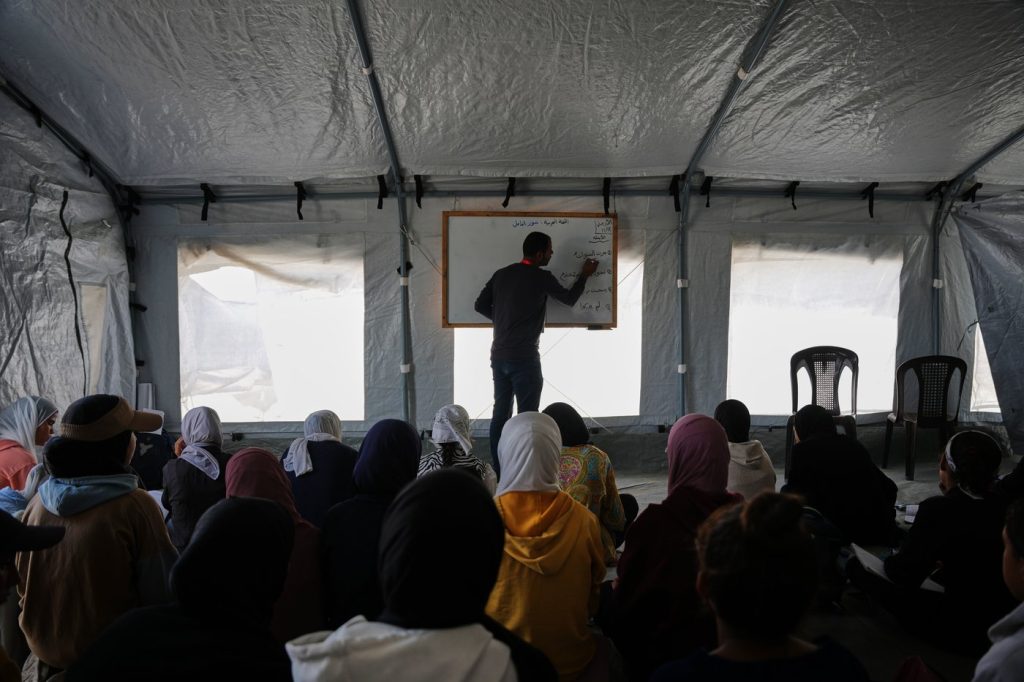DEIR AL-BALAH, Gaza Strip (AP) — Bissan Younis expressed her sorrow as she stood outside a cluster of tents surrounded by rubble, a scene all too common across the Gaza Strip. This encampment was yet another makeshift school, which unfortunately had no room for her teenage son, Kareem. “Most of the schools are destroyed,” she told reporters. “Every school I go to tells me there is no room.”
In the aftermath of the ongoing conflict, over 600,000 Palestinian children in Gaza have missed two academic years due to the war between Israel and the militant Hamas group. Instead of engaging in education, these children have been displaced repeatedly, fleeing from airstrikes and shelling, while often searching for water and food to support their families.
Following a ceasefire reached last month, humanitarian officials are making urgent efforts to reopen dozens of makeshift schools. John Crickx, a spokesperson for UNICEF, emphasized the necessity for children to return to school not just for education, but also for their mental health. He warned that without education, there could be “terrible consequences for an entire generation.” UNICEF reports that more than 630,000 children missed school during the conflict, with only about 100,000 having managed to return to class.
The UN agency for Palestinian refugees (UNRWA) is providing some educational services to around 40,000 students through their contracted teachers. However, many UNRWA schools that previously accommodated half of Gaza's school-aged children have been repurposed as shelters for displaced families.
Lack of space poses a significant challenge: numerous schools have suffered extensive damage or complete destruction, and many are being used as shelters for those displaced during the relentless bombardment. Crickx described the learning environment as “the most basic,” consisting of tents among the displaced people’s shelters. In one makeshift school, children gathered closely to their teacher, showing great eagerness for learning.
Crickx noted the difficulty of finding locations to set up tents, alongside challenges in delivering supplies, whether it be concrete to repair damaged schools or essential items like pencils and erasers. Since the onset of the war on October 7, 2023, Israel has restricted the entry of these materials into Gaza, deeming them “non-critical, non-life saving.”
Even the children fortunate enough to attend makeshift schools carry the heavy psychological burdens of war and displacement. “The level of trauma among the people of Gaza, including children, is horrific,” said Juliette Touma, communications director of UNRWA. As U.N. agencies continue to assess damages and costs for rebuilding, they warn that the reconstruction process could take years and cost upwards of $70 billion.
As displaced families continue to inhabit the ruins of damaged schools, UNRWA reports that approximately 75,000 people still shelter within its facilities. One displaced individual, Tahreer al-Oweini, expressed her guilt for living in a classroom meant for education, surrounded by damaged walls and tarps. Her struggle to secure spots for her three school-aged children has been met with setbacks, as she recalled being turned away even after offering to find furniture for her daughter.
“The children have forgotten everything they learned,” al-Oweini lamented, describing their lives over the past two years dominated by water shortages, scrambling for aid, and living in constant fear. Despite sporadic educational efforts in displacement camps, families often kept their children close, fearing for their safety amid ongoing violence.
The urgency to return children to school is magnified by concerns of creating a “lost generation.” If children remain out of education for extended periods, they risk becoming vulnerable to exploitation, including child marriage and child labor. Al-Oweini holds onto hope for her children’s futures, wishing for them to pursue careers like their father, who completed university. “They have ambition,” she said. “But if they don’t go to school, they will have no future.”
___
Wafaa Shurafa And Kareem Chehayeb, The Associated Press











